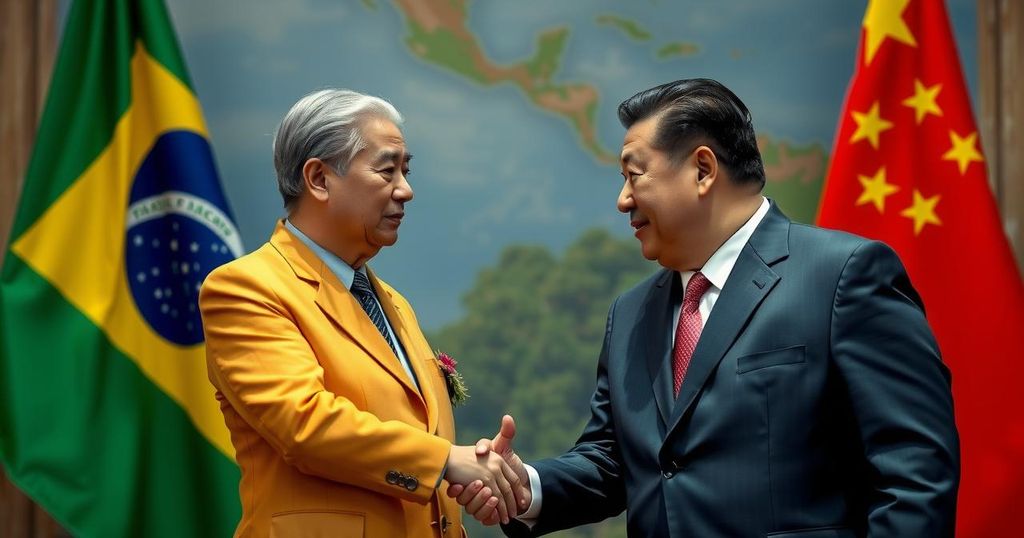Global news
AFRICA, ASIA, ASIA - PACIFIC ECONOMIC COOPERATION, BEIJING, BELT AND ROAD INITIATIVE, BRASILIA, BRAZIL, BRITAIN, CHINA, ECONOMIC COOPERATION, ECONOMIE, EUROPE, FRANCE, GEOPOLITICS, GERMANY, GROUP OF 20, INDIA, INTERNATIONAL RELATIONS, LIMA, LU, LUIZ INACIO LULA DA SILVA, LULA, MEXICO, NORTH AMERICA, PERU, RIO DE JANEIRO, SERBIA, SOUTH AFRICA, SOUTH AMERICA, STRATEGIC PARTNERSHIP, TRADE RELATIONS, U. S, UNITED STATES, VIETNAM, WHITE HOUSE, XI JINPING
Isaac Bennett
0 Comments
China and Brazil Forge Stronger Ties Amid Global Shifts
Chinese President Xi Jinping and Brazilian President Luiz Inacio Lula da Silva have enhanced bilateral ties, establishing a strategic partnership defined as a “Community with a Shared Future for a More Just World and Sustainable Planet.” During the state visit, nearly 40 cooperation agreements were signed to foster economic collaboration, amidst a backdrop of U.S. geopolitical shifts and China’s efforts to consolidate its influence within global forums.
Chinese President Xi Jinping and Brazilian President Luiz Inacio Lula da Silva have elevated their nations’ relationship to a global strategic partnership during a recent state visit. The leaders agreed on a vision for a
“Community with a Shared Future for a More Just World and Sustainable Planet,” aligning with China’s diplomatic initiatives. They announced nearly 40 cooperation agreements aimed at enhancing economic ties, which encompass over $150 billion in bilateral trade. President Xi emphasized the importance of their partnership, stating that China is prepared to cultivate them as “golden partners.”
The visit followed significant summits in Lima and Rio de Janeiro, where Xi also convened with other global leaders. In a backdrop of declining influence from U.S. President Joe Biden, Xi’s leadership appears to be increasingly proactive in filling a diplomatic void, particularly amidst ongoing geopolitical tensions. Xi’s engagements reflect a strategic effort to broaden China’s role in global affairs by fostering collaborative international relations.
China’s commitment to constructive diplomacy has been noted by various diplomats, who perceive a shift towards a more cooperative stance, evident in multilateral discussions that have included topics traditionally outside China’s immediate interests. This diplomatic approach signals a desire to assert more influence within international frameworks left unoccupied by a more isolationist United States.
The recent state visit by Presidents Xi Jinping and Luiz Inacio Lula da Silva underscores a strategic elevation of China-Brazil relations amid shifting global dynamics. China’s ongoing initiative to position itself through global partnerships reflects its desire to expand diplomatic influence, especially in developing economies. The backdrop of U.S. geopolitical adjustments has allowed Xi to strengthen ties with Brazil, a key player in the BRICS coalition, further emphasizing China’s commitment to its diplomatic efforts. This partnership is particularly significant as both leaders pursue synergies in economic development and infrastructure despite initial hesitations around specific initiatives like the Belt and Road Initiative. The evolving atmosphere within international politics, particularly given the changing U.S. leadership landscape, contributes to these multifaceted engagements.
In conclusion, the state visit by Chinese President Xi Jinping and Brazilian President Luiz Inacio Lula da Silva marks a significant advancement in diplomatic relations between the two nations. The formulation of a strategic partnership encapsulates broader global ambitions that align with mutual interests. As China seeks to solidify its role in international diplomacy, the partnership with Brazil signifies a proactive approach to global governance, particularly in the face of a shifting geopolitical landscape following U.S. political transitions. The negotiations reveal China’s adaptable diplomatic strategies in a transitional global environment.
Original Source: www.voanews.com




Post Comment